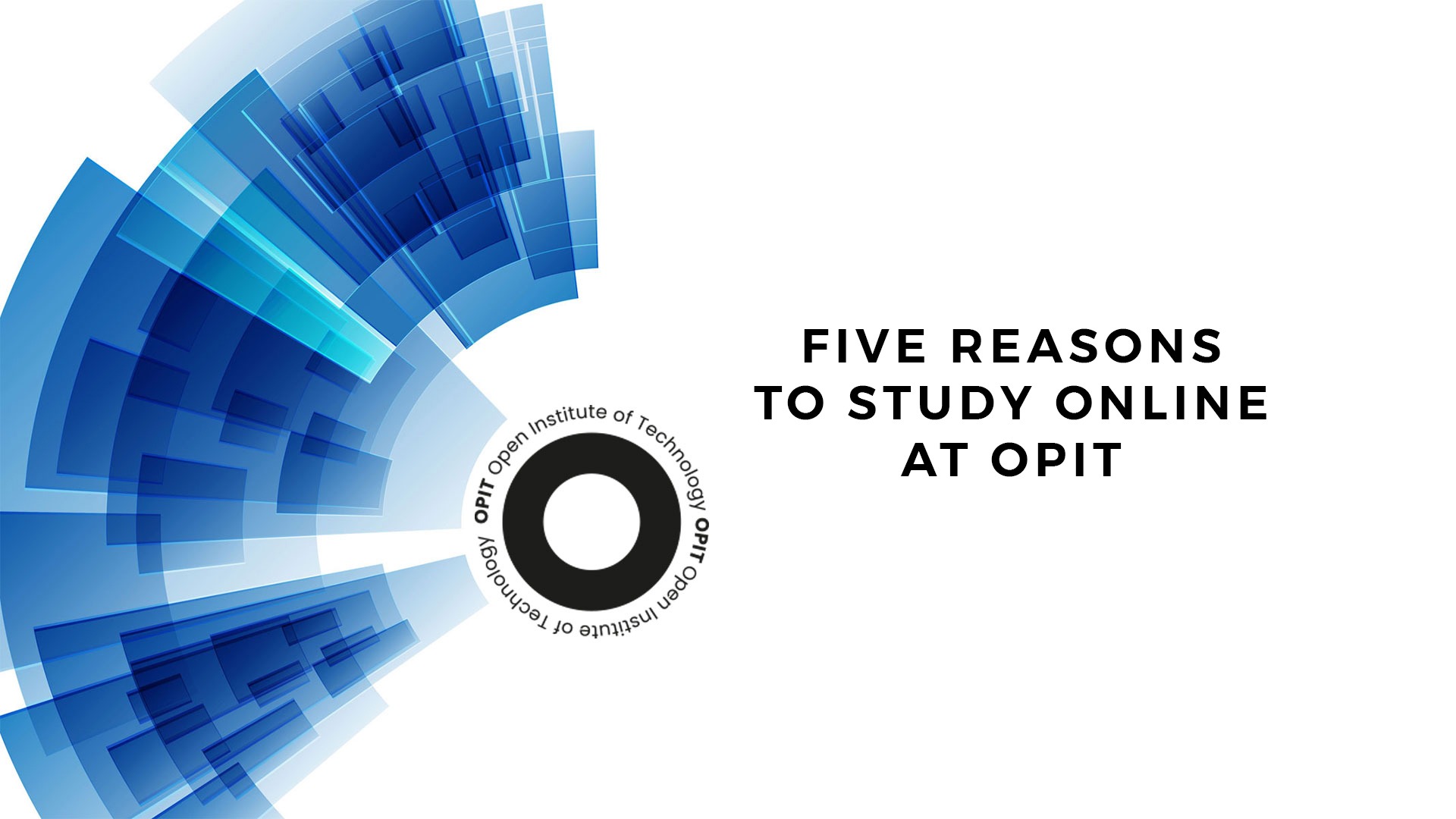

Far from being a temporary educational measure that came into its own during the pandemic, online education is providing students from all over the world with new ways to learn. That’s proven by statistics from Oxford Learning College, which point out that over 100 million students are now enrolled in some form of online course.
The demand for these types of courses clearly exists.
In fact, the same organization indicates that educational facilities that introduce online learning see a 42% increase in income – on average – suggesting that the demand is there.
Enter the Open Institute of Technology (OPIT).
Delivering three online courses – a Bachelor’s degree in computer science and two Master’s degrees – with more to come, OPIT is positioning itself as a leader in the online education space. But why is that? After all, many institutions are making the jump to e-learning, so what separates OPIT from the pack?
Here, you’ll discover the answers as you delve into the five reasons why you should trust OPIT for your online education.
Reason 1 – A Practical Approach
OPIT focuses on computer science education – a field in which theory often dominates the educational landscape. The organization’s Rector, Professor Francesco Profumo, makes this clear in a press release from June 2023. He points to a misalignment between what educators are teaching computer science students and what the labor market actually needs from those students as a key problem.
“The starting point is the awareness of the misalignment,” he says when talking about how OPIT structures its online courses. “That so-called mismatch is generated by too much theory and too little practical approach.” In other words, students in many classes spend far too much time learning the “hows” and “whys” behind computerized systems without actually getting their hands dirty with real work that gives them practical experience in using those systems.
OPIT takes a different approach.
It has developed a didactic approach that focuses far more on the practical element than other courses. That approach is delivered through a combination of classroom sessions – such as live lessons and masterclasses – and practical work offered through quizzes and exercises that mimic real-world situations.
An OPIT student doesn’t simply learn how computers work. They put their skills into practice through direct programming and application, equipping them with skills that are extremely attractive to major employers in the tech field and beyond.
Reason 2 – Flexibility Combined With Support
Flexibility in how you study is one of the main benefits of any online course.
You control when you learn and how you do it, creating an environment that’s beneficial to your education rather than being forced into a classroom setting with which you may not feel comfortable. This is hardly new ground. Any online educational platform can claim that it offers “flexibility” simply because it provides courses via the web.
Where OPIT differs is that it combines that flexibility with unparalleled support bolstered by the experiences of teachers employed from all over the world. The founder and director of OPIT, Riccardo Ocleppo, sheds more light on this difference in approach when he says, “We believe that education, even if it takes place physically at a distance, must guarantee closeness on all other aspects.” That closeness starts with the support offered to students throughout their entire study period.
Tutors are accessible to students at all times. Plus, every participant benefits from weekly professor interactions, ensuring they aren’t left feeling stuck on an educational “island” and have to rely solely on themselves for their education. OPIT further counters the potential isolation that comes with online learning with a Student Support team to guide students through any difficulties they may have with their courses.
In this focus on support, OPIT showcases one of its main differences from other online platforms.
You don’t simply receive course material before being told to “get on with it.” You have the flexibility to learn at your own pace while also having a support structure that serves as a foundation for that learning.
Reason 3 – OPIT Can Adapt to Change Quickly
The field of computer science is constantly evolving.
In the 2020s alone, we’ve seen the rise of generative AI – spurred on by the explosive success of services like ChatGPT – and how those new technologies have changed the way that people use computers.
Riccardo Ocleppo has seen the impact that these constant evolutions have had on students. Before founding OPIT, he was an entrepreneur who received first-hand experience of the fact that many traditional educational institutions struggle to adapt to change.
“Traditional educational institutions are very slow to adapt to this wave of new technologies and trends within the educational sector,” he says. He points to computer science as a particular issue, highlighting the example of a board in Italy of which he is a member. That board – packed with some of the country’s most prestigious tech universities – spent three years eventually deciding to add just two modules on new and emerging technologies to their study programs.
That left Ocleppo feeling frustrated.
When he founded OPIT, he did so intending to make it an adaptable institution in which courses were informed by what the industry needs. Every member of its faculty is not only a superb teacher but also somebody with experience working in industry. Speaking of industry, OPIT collaborates with major companies in the tech field to ensure its courses deliver the skills that those organizations expect from new candidates.
This confronts frustration on both sides. For companies, an OPIT graduate is one for which they don’t need to bridge a “skill gap” between what they’ve learned and what the company needs. For you, as a student, it means that you’re developing skills that make you a more desirable prospect once you have your degree.
Reason 4 – OPIT Delivers Tier One Education
Despite their popularity, online courses can still carry a stigma of not being “legitimate” in the face of more traditional degrees. Ocleppo is acutely aware of this fact, which is why he’s quick to point out that OPIT always aims to deliver a Tier One education in the computer science field.
“That means putting together the best professors who create superb learning material, all brought together with a teaching methodology that leverages the advancements made in online teaching,” he says.
OPIT’s degrees are all accredited by the European Union to support this approach, ensuring they carry as much weight as any other European degree. It’s accredited by both the European Qualification Framework (EQF) and the Malta Qualification Framework (MQF), with all of its courses having full legal value throughout Europe.
It’s also here where we see OPIT’s approach to practicality come into play via its course structuring.
Take its Bachelor’s degree in computer science as an example.
Yes, that course starts with a focus on theoretical and foundational knowledge. Building a computer and understanding how the device processes instructions is vital information from a programming perspective. But once those foundations are in place, OPIT delivers on its promises of covering the most current topics in the field.
Machine learning, cloud computing, data science, artificial intelligence, and cybersecurity – all valuable to employers – are taught at the undergraduate level. Students benefit from a broader approach to computer science than most institutions are capable of, rather than bogging them down in theory that serves little practical purpose.
Reason 5 – The Learning Experience
Let’s wrap up by honing in on what it’s actually like for students to learn with OPIT.
After all, as Ocleppo points out, one of the main challenges with online education is that students rarely have defined checkpoints to follow. They can start feeling lost in the process, confronted with a metaphorical ocean of information they need to learn, all in service of one big exam at the end.
Alternatively, some students may feel the temptation to not work through the materials thoroughly, focusing instead on passing a final exam. The result is that those students may pass, but they do so without a full grasp of what they’ve learned – a nightmare for employers who already have skill gaps to handle.
OPIT confronts both challenges by focusing on a continuous learning methodology. Assessments – primarily practical – take place throughout the course, serving as much-needed checkpoints for evaluating progress. When combined with the previously mentioned support that OPIT offers, this approach has led to courses that are created from scratch in service of the student’s actual needs.
Choose OPIT for Your Computer Science Education
At OPIT, the focus lies as much on helping students to achieve their dream careers as it does on teaching them. All courses are built collaboratively. With a dedicated faculty combined with major industry players, such as Google and Microsoft, it delivers materials that bridge the skill gap seen in the computer science field today.
There’s also more to come.
Beyond the three degrees OPIT offers, the institution plans to add more. Game development, data science, and cloud computing, to name a few, will receive dedicated degrees in the coming months, accentuating OPIT’s dedication to adapting to the continuous evolution of the computer science industry. Discover OPIT today – your journey into computing starts with the best online education institution available.
Have questions?
Visit our FAQ page or get in touch with us!
Write us at +39 335 576 0263
Get in touch at hello@opit.com
Talk to one of our Study Advisors
We are international
We can speak in:




